CAMPAIGN NEWS
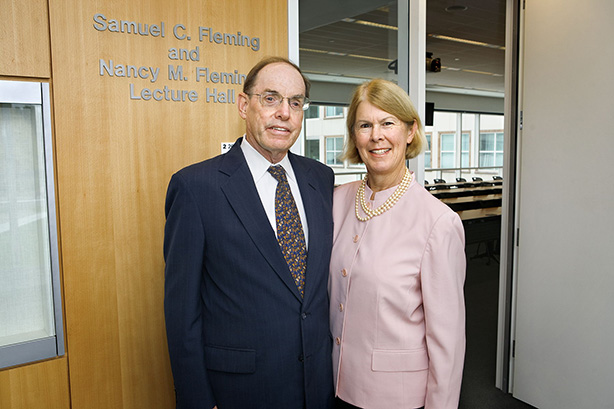
Trustee Emeritus Sam Fleming '62 and his wife, Nancy Fleming.
Fleming gift creates graduate fellowships in biomolecular engineering
In March, longtime Cornell University supporters Trustee Emeritus Sam Fleming '62 and his wife, Nancy Fleming, made a $5 million gift to create new graduate fellowships in the School of Chemical and Biomolecular Engineering. Of this latest gift from a couple who has long supported Cornell, Professor Lynden Archer, the William C. Hooey Director of the school, says, "The timing couldn't have been better."
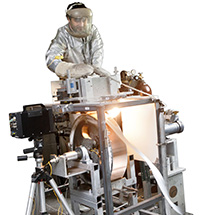
A student working in the CBE labs. See larger image
Good timing is a recurring theme for Sam Fleming. When he was a junior in high school in Wilmington, Delaware, Fleming's chemistry teacher invited him to visit Cornell for a weekend on a trip sponsored by Walter Carpenter, the DuPont executive for whom Carpenter Hall and several professorships at Cornell are named. "Once I'd seen Cornell," Fleming remembers, "that was the only place for me."
Fleming's high school classmate and friend (later to become his wife) was Nancy McAdam, whose father worked as an engineer at DuPont and whose family also had strong ties to Cornell. Her great uncle John Vaughan McAdam was an engineering graduate of Cornell, Class of 1900. While Sam was an undergraduate at Cornell, Nancy was earning her degree at Mount Holyoke College. She earned a second degree in the Radcliffe Graduate Program in Landscape Design. She had a long career with her own design firm and is also the author of two books.
When he graduated from Cornell with a five-year bachelor's degree in chemical engineering in 1963, Sam Fleming realized he was in the right place at the right time, with knowledge of a field that was about to explode and change the face of a thousand industries.
"I had majored in polymer science, the hottest thing you could imagine," Fleming explains. "Instantaneously I saw how one part of the world was going to change radically over a 10-year period. Think of cars. At that time, there were almost no plastics used in building a car. What immediately came to pass is that everybody trying to make a cheaper but still positive car looked to plastics."
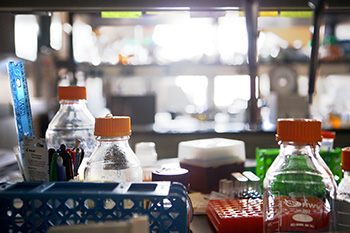
Detail from the Olin Hall lab of chemical and biomolecular engineering (CBE) graduate student Michael-Paul Robinson. See larger image
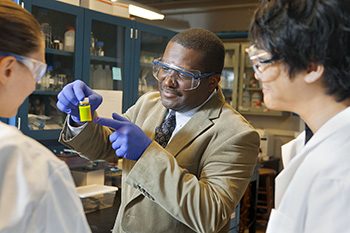
Lynden Archer, professor and director of the School of Chemical and Biomolecular Engineering, in his lab with students. See larger image
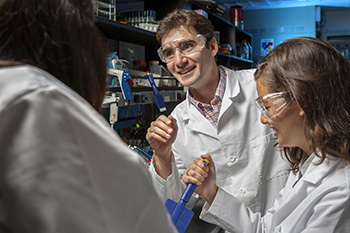
CBE professor Matt DeLisa in his lab with students. See larger image
And luckier still was the fact that Fleming happened to work at a major consulting firm, a firm that had a big business in telling clients what was going to be happening three years in the future. Fleming thought to himself, why not 10 years?
"When I first got the idea very early on, I was just a newcomer. It was just the first year or two and all I was doing was work for the senior people, but I had a chance to say, 'Here are the things I think are going to be the things of the future.' They thought I was right, and they supported me."
That support allowed Fleming to found a new division within Arthur D. Little Consulting focused on providing clients with information and predictions for the chemical industry 10 years in the future. It was an almost instant success. In 1989, he led a buy-out of Arthur D. Little Decision Resources to form Decision Resources Inc. He served as chairman and chief executive officer through 2003.
He immediately expanded the consulting at Decision Resources to encompass not only chemical engineering, but biomolecular engineering, too.
"Sam was well ahead of his time," says Archer, "to understand the potential of biomolecular engineering when most of our field had their attention elsewhere – on materials, on petrochemicals."
"It is frankly remarkable that chemical engineering as a field only recently embraced the challenge of engineering biomolecules," Archer explains. "In 2002, my colleague and former director Michael Shuler led the school of chemical engineering to add biomolecular engineering to its name." Cornell's became the first chemical and biomolecular engineering program in the country.
Sharing an example of the cutting-edge work that will be supported by the Fleming gift, Archer cites professor Matt DeLisa's lab: "The DeLisa group has a vision of engineering bacteria such as E. coli to make properly glycosylated proteins for human therapeutics in a scalable, cost-effective process. Success will ultimately provide new, even novel routes towards lower-cost therepeutics."
The Fleming fellowships, which will be awarded to four graduate students per year, will help attract highly qualified students to groups like DeLisa's.
"Sam Fleming visited our department about nine months ago and met with a subset of faculty and graduate students working in the biomolecular engineering area," Archer reports. "My colleagues to a person loved Sam's aura. What a wonderful man. By showing that he can trace with a bright line his phenomenal successes in the private sector right back to the principles he studied, and habits he developed, decades ago as a student of chemical engineering at Cornell, Sam provides a reminder to all of us that we are truly educating engineers for careerlong success and lifelong impacts."